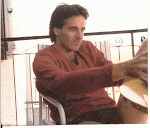
Some beautiful quotes of my favorite physicist Richard Feynman. He was a second Dirac, only this time .. human !
You know, the most amazing thing happened to me tonight. I was coming here, on the way to the lecture, and I came in through the parking lot. And you won't believe what happened. I saw a car with the license plate ARW 357. Can you imagine? Of all the millions of license plates in the state, what was the chance that I would see that particular one tonight? Amazing! (Six Easy Pieces)
Science as a method of finding things out is based on the principle that observation is the judge of whether something is so or not. All other aspects and characteristics of science can be understood directly when we understand that observation is the ultimate and final judge of the truth of an idea. Or, put another way, "The exception proves that the rule is wrong." That is the principle of science. If there is an exception to any rule, and if it can be proved by observation, that rule is wrong. (The Meaning of It All)
I can live with doubt, and uncertainty, and not knowing. I think it's much more interesting to live not knowing than to have answers which might be wrong. I have approximate answers, and possible beliefs, and different degrees of certainty about different things, but I’m not absolutely sure of anything, and in many things I don’t know anything about, such as whether it means anything to ask why we’re here, and what the question might mean. I might think about a little, but if I can’t figure it out, then I go to something else. But I don’t have to know an answer. I don’t feel frightened by not knowing things, by being lost in a mysterious universe without having any purpose, which is the way it really is, as far as I can tell, possibly. It doesn’t frighten me. (The Pleasure of Finding Things Out)
In general we look for a new law by the following process. First we guess it. Then we compute the consequences of the guess to see what would be implied if this law that we guessed is right. Then we compare the result of the computation to nature, with experiment or experience, compare it directly with observation, to see if it works. If it disagrees with experiment it is wrong. In that simple statement is the key to science. It does not make any difference how beautiful your guess is. It does not make any difference how smart you are, who made the guess, or what his name is – if it disagrees with experiment it is wrong. That is all there is to it. (The Character of Physical Law)
If, in some cataclysm, all scientific knowledge were to be destroyed, and only one sentence passed on to the next generation of creatures, what statement would contain the most information in the fewest words? I believe it is the atomic hypothesis (or atomic fact, or whatever you wish to call it) that all things are made of atoms — little particles that move around in perpetual motion, attracting each other when they are a little distance apart, but repelling upon being squeezed into one another. In that one sentence you will see an enormous amount of information about the world, if just a little imagination and thinking are applied. (The Feynman Lectures on Physics)
PS. Do not hesitate to click on the 2 images
PS. Do not hesitate to click on the 2 images
:)







































































































































































































4 comments:
top of his class...
το ένα quote καλύτερο από το άλλο...
το παραδέχομαι, ευχαριστώ που μου τον "σύστησες"
γεια
Nα'σαι καλά Ναταλία !
Σαν θεατρόφιλη που σίγουρα είσαι, δες στο παρακάτω link ένα διαχρονικό αριστούργημα του λατρεμένου Tom Stoppard:
Professional Foul (1977)
Kαλή βδομάδα !
:)
What a beautiful mind .. Richard Feynman.. So deep and from the other hand so simple....
Simplicity is connected with beauty and truth, Monika !
Another beautiful mind was Paul Dirac, co-inventor of quantum mechanics, also known for conceiving anti-matter (before its experimental discovery!) and for his deeply eccentric behavior.
For him, the most important attribute of a fundamental theory is its mathematical beauty. According to Dirac, a beautiful (simple) theory is more likely to be right than a theory that is ugly (complicated). I always had the same view ..
I hope you like the following 2 videos:
Paul Dirac and Mathematical Beauty
Murray Gell-Mann: Beauty and truth in physics
:)
Post a Comment